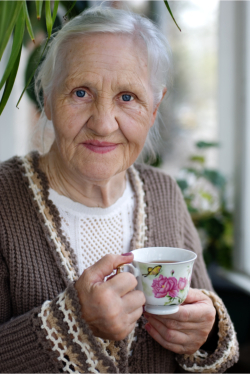
Adult Day Care offers a variety of health and social services for one-third to one-half the cost of home health or nursing home care. Home health care agencies and nursing homes nationwide are facing shortages in the paraprofessional work force. Adult day care centers are able to provide services with adequate staffing care required to work evening and weekend shifts. Desirable hours and the congregate setting contribute to the efficacy and cost-effectiveness of adult day programs.
Adult day services are commonly referred to as “the best kept secret in long-term care.” This community-based group program offers participants and their caregivers a viable alternative to nursing home care. Experts agree that despite the efficacy and cost-effectiveness of adult day services, they remain underutilized due to consumers’ lack of awareness and inadequate reimbursement.
The Facility
Adult day programs are offered in a variety of settings: in a freestanding building; on the campus of a hospital, nursing home, or assisted living facility; or in conjunction with another program, such as a home health agency. Participants can expect centers to offer services in a building that is handicapped-accessible. Every center, regardless of the setting, must have bathrooms (one toilet for every ten participants at minimum, according to NADSA), staff offices, and activity space. Additional space may include therapy rooms or offices, a bathtub and/or shower room, laundry area with washer and dryer, nursing clinic, large and small activity spaces, and a kitchen area (for snack preparation). NADSA recommends a minimum of sixty square feet of space per participant. This figure excludes staff offices, corridors, bathrooms, closets, and similar space that is not solely for participants’ activities.
Goals of the Adult Day Program
The Adult Day Care Center in Greenacres Florida setting offers stimulation and growth for participants with impairments while providing respite for families and caregivers. Based on these premises, the NADSA Standards (revised 1997) establish the following goals for adult day centers:
- Promote the individual’s maximum level of independence.
- Maintain the individual’s present level of functioning as long as possible, preventing or delaying further deterioration.
- Restore and rehabilitate the individual to the highest possible level of functioning.
- Provide support, respite, and education for families and other caregivers.
- Foster socialization and peer interaction.
- Serve as an integral part of the community service network and the long-term care continuum.
These overall goals are coupled with each participant’s individual plan of care to maintain an optimal level of physical and mental health.
Care Models
 Adult day care services are delivered, most generally, in one of two program types: the social model or the medical model. The primary focus of the social model is opportunities for socialization and recreation. Such programs typically offer limited health care and rehabilitative services. Participants who attend social model programs usually enjoy fair physical health, but would otherwise lack opportunities to socialize with peers. If participants require medication during their time at the center, it is usually self-administered.
Adult day care services are delivered, most generally, in one of two program types: the social model or the medical model. The primary focus of the social model is opportunities for socialization and recreation. Such programs typically offer limited health care and rehabilitative services. Participants who attend social model programs usually enjoy fair physical health, but would otherwise lack opportunities to socialize with peers. If participants require medication during their time at the center, it is usually self-administered.
The medical model program has intensive nursing and rehabilitative services as the primary focus. Participants who attend such programs usually have multiple chronic conditions that require monitoring and/or a nursing intervention, and medication administration at least once during the day.
Approximately thirty-five states license or accredit adult day programs. For example, a center may be licensed as a social and/or a medical model. Each program determines which level of licensure is most appropriate.
Services Offered
The types of services offered in an adult day care center vary according to whether the program is medical or social. Medical model programs offer nursing care provided by a registered nurse or a licensed practical nurse under a registered nurse’s supervision. The nursing care can include medication administration, wound dressing changes, injections, and overall health monitoring. Medical programs also provide or arrange for physical, speech, and occupational therapy. Social model programs tend to be more limited in their scope of services. They emphasize opportunities for socialization, activities, and outings. Medical model programs offer similar social programming in addition to nursing care. Additional services that are offered in both types of programs are therapeutic activities; meals and snacks with special dietary accommodations (for example, diabetic or renal diet); door-to-door transportation; social services provided by a licensed social worker; shower or bath; toileting assistance; grooming; and caregiver support.
Participant Profile
 Each center’s organizational leadership determines what level of participant impairment it can accommodate. This decision is based on the center’s design, staffing complement, community demand, and, in some cases, available reimbursement. According to the NADSA, the average age of adult day participants is seventy-four years. Although the adult day center population is largely comprised of older adults, many centers across the country have developed programs to meet the needs of young, disabled adults. The majority of adult day participants are women. Common participant diagnoses include Alzheimer’s disease or a related dementia, diabetes, stroke, Parkinson’s disease, and cardiovascular disease. The primary reasons for attending an adult day center are the need for socialization, the need for caregiver respite, and the need for supervision or assistance with activities of daily living. Individuals attend adult day centers an average of three to four days per week.
Each center’s organizational leadership determines what level of participant impairment it can accommodate. This decision is based on the center’s design, staffing complement, community demand, and, in some cases, available reimbursement. According to the NADSA, the average age of adult day participants is seventy-four years. Although the adult day center population is largely comprised of older adults, many centers across the country have developed programs to meet the needs of young, disabled adults. The majority of adult day participants are women. Common participant diagnoses include Alzheimer’s disease or a related dementia, diabetes, stroke, Parkinson’s disease, and cardiovascular disease. The primary reasons for attending an adult day center are the need for socialization, the need for caregiver respite, and the need for supervision or assistance with activities of daily living. Individuals attend adult day centers an average of three to four days per week.
A visit to Greenacres Adult Day Care is one of the most reliable means to judge a program’s level of quality. According to the NADSA, the following questions are important: Do visitors feel welcome at the center? Do staff members spend time finding out what a prospective participant wants and needs? Do staff members clearly explain the center’s activities and services? Do staff members give information about staffing ratios and qualifications, program procedures, costs, and care-giver expectations? Is the center clean, pleasant, and odor-free? Is the center wheelchair accessible? Is the furniture sturdy, clean, and comfortable? Do staff, volunteers, and participants appear cheerful? Are participants encouraged to help plan activities or make suggestions for program improvement? Current and past caregivers and participants may provide valuable information regarding a center’s level of quality. Please send your comments to us at: info@greenacresadultdaycare.com
Adult day centers are an integral part of the long-term care continuum. Caregivers and participants benefit from the health and social services that are provided in a group setting for costs that are significantly lower than those typical in nursing home and home health care. And perhaps most important to caregivers and participants, adult day participants are able to continue living in the community while delaying or preventing inappropriate institutionalization.
Lifted from source: http://www.encyclopedia.com/topic/Adult_Day_Care.aspx



